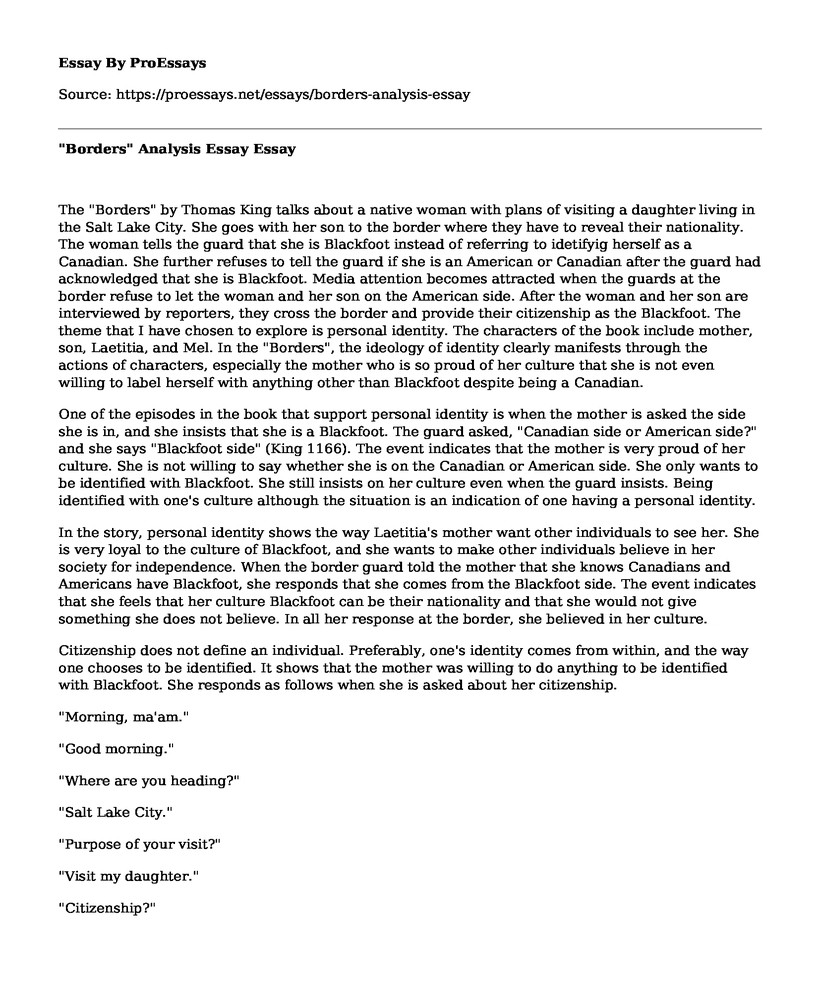The "Borders" by Thomas King talks about a native woman with plans of visiting a daughter living in the Salt Lake City. She goes with her son to the border where they have to reveal their nationality. The woman tells the guard that she is Blackfoot instead of referring to idetifyig herself as a Canadian. She further refuses to tell the guard if she is an American or Canadian after the guard had acknowledged that she is Blackfoot. Media attention becomes attracted when the guards at the border refuse to let the woman and her son on the American side. After the woman and her son are interviewed by reporters, they cross the border and provide their citizenship as the Blackfoot. The theme that I have chosen to explore is personal identity. The characters of the book include mother, son, Laetitia, and Mel. In the "Borders", the ideology of identity clearly manifests through the actions of characters, especially the mother who is so proud of her culture that she is not even willing to label herself with anything other than Blackfoot despite being a Canadian.
One of the episodes in the book that support personal identity is when the mother is asked the side she is in, and she insists that she is a Blackfoot. The guard asked, "Canadian side or American side?" and she says "Blackfoot side" (King 1166). The event indicates that the mother is very proud of her culture. She is not willing to say whether she is on the Canadian or American side. She only wants to be identified with Blackfoot. She still insists on her culture even when the guard insists. Being identified with one's culture although the situation is an indication of one having a personal identity.
In the story, personal identity shows the way Laetitia's mother want other individuals to see her. She is very loyal to the culture of Blackfoot, and she wants to make other individuals believe in her society for independence. When the border guard told the mother that she knows Canadians and Americans have Blackfoot, she responds that she comes from the Blackfoot side. The event indicates that she feels that her culture Blackfoot can be their nationality and that she would not give something she does not believe. In all her response at the border, she believed in her culture.
Citizenship does not define an individual. Preferably, one's identity comes from within, and the way one chooses to be identified. It shows that the mother was willing to do anything to be identified with Blackfoot. She responds as follows when she is asked about her citizenship.
"Morning, ma'am."
"Good morning."
"Where are you heading?"
"Salt Lake City."
"Purpose of your visit?"
"Visit my daughter."
"Citizenship?"
"Blackfoot," my mother told him
"Ma'am?"
"Blackfoot," my mother repeated.
"Canadian"
"Blackfoot" (King 1165)
The above dialogue shows that to Laetitia's mother, citizenship does not mother. Instead, the personal identity is what matters most and in this case being a Blackfoot is what matters to her. Furthermore, when mother and son arrived at the Canadian border, and they find a young woman who was happy to see them. She asked "Citizenship?" and the mother answered "Blackfoot." The lady then replied, "I know," said the woman, "and I'd be proud of being Blackfoot if I were Blackfoot. But you have to be American or Canadian" (King 1167). The event indicates that the woman is still proud of her identity even when the previous guards told her that Blackfoot is not citizenship as they exist in both the two countries. The woman again goes ahead to label herself as a Blackfoot. She believes in herself and her culture.
The mother had self-identity in the way she responded to the different guards she met. Through the mother, it is vital to learn that one should be proud of where he or she comes from despite the situation. The son said, "It would have been easier if my mother had just said "Canadian" and been done with it, but I could see she wasn't going to do that. The guard wasn't angry or anything. He smiled and looked towards the building. Then he turned back and nodded" (King 1165).The mother was proud of her culture, and that made her have self-identity. One should not be ashamed where he or she comes from; instead, they should take pride in their roots despite the struggles they are facing.
Conclusion
In conclusion, the journey that the mother and son revealed that there is a difference between citizenship and identity. Personal identity is one of the essential themes in the story. The woman believes in her culture, and even when she is asked about her citizenship, she says that she is a Blackfoot. She repeats the same thing to different guards. She believes in her culture, and that is what she wants to be identified with all the time. The various events show that personal identity matters to the woman as she wants to be loyal to her culture and the only way to do that is by being identified with it in all situations.
Work Cited
King, Thomas. "Borders." World Literature Today 66.2 (1992): 1163-1171.
Cite this page
"Borders" Analysis Essay. (2022, Apr 04). Retrieved from https://proessays.net/essays/borders-analysis-essay
If you are the original author of this essay and no longer wish to have it published on the ProEssays website, please click below to request its removal:
- The Representation of the American Dream in T. C. Boyle's The Tortilla Curtain
- Literary Analysis Essay on "Salvage" by Orson Scott Card
- Literary Analysis Essay on "Love in the Time of Cholera" by Marquez
- Essay Sample on Myth: Then and Now
- Conflict as Source of Tragedy in The Antigone Essay Example
- Essay Example on Bradstreet & Rowlandson: Writing God's Word & Will
- Free Essay Example on Moral Theory Versus Utilitarian Theory







